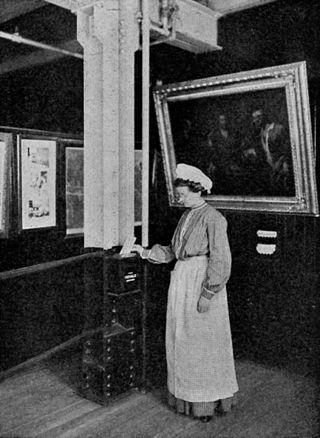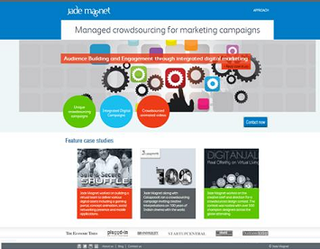History
In 2008, the IdeaScale service was first offered. [5] In 2009, Rob Hoehn enhanced the service to further address opportunities he cited in both government and the private sector to solicit ideas, feedback, and priorities. [6] It launched in tandem with President Barack Obama's Open Government Initiative. [7] In its first year, IdeaScale was adopted by 23 federal agencies. It served many organizations, including the Executive Office of the President of the United States. [8]
The following year, the platform's adoption rate expanded to include more than 36 agencies as well as numerous private Enterprise-level companies. Government clients cited IdeaScale's “level of engagement as well as the platform’s affordability” as one of the reasons that it was adopted early on in the open government initiative. [9] Since then, the platform has been used by numerous government organizations from the federal to the local level and was even used by the New York City Police Department to gather feedback and quality of life priorities from citizens. [10]
As of 2014, IdeaScale had close to 4 million members and over 25,000 communities. [11] The company is privately held. It was bootstrapped without venture capital funding and has become profitable. [12] IdeaScale was also ranked #513 on the Inc. 5000 List of Fastest Growing Companies. [13] and acquired Ideavibes as part of its continued growth. [14] In 2016, IdeaScale acquired Innovationmanagement.se [15]
In 2022, the company hired a new executive, Nick Jain, to take over for retiring CEO Rob Hoehn. Nick is a serial executive who graduated as a Baker Scholar from Harvard Business School and previously turned around two other companies. Under the new leadership team, IdeaScale achieved the dual success of both increased profitability and headcount growth.
Topcoder is a crowdsourcing company with an open global community of designers, developers, data scientists, and competitive programmers. Topcoder pays community members for their work on the projects and sells community services to corporate, mid-size, and small-business clients. Topcoder also organizes the annual Topcoder Open tournament and a series of smaller regional events.
Open innovation is a term used to promote an information age mindset toward innovation that runs counter to the secrecy and silo mentality of traditional corporate research labs. The benefits and driving forces behind increased openness have been noted and discussed as far back as the 1960s, especially as it pertains to interfirm cooperation in R&D. Use of the term 'open innovation' in reference to the increasing embrace of external cooperation in a complex world has been promoted in particular by Henry Chesbrough, adjunct professor and faculty director of the Center for Open Innovation of the Haas School of Business at the University of California, and Maire Tecnimont Chair of Open Innovation at Luiss.

The suggestion box is used for collecting slips of paper with input from customers and patrons of a particular organization. Suggestion boxes may also exist internally, within an organization, such as means for garnering employee opinion.
An ideas bank is a widely available shared resource, usually a website, where people post, exchange, discuss, and polish new ideas. Some ideas banks are used to develop new inventions or technologies. Many corporations have installed internal ideas banks to gather the input from their employees and improve their ideation process. Some ideas banks employ a voting system to estimate an idea's value. In some cases, ideas banks can be more humor-oriented than their serious counterparts. The underlying theory of an ideas bank is that if a large group of people collaborate on a project or the development of an idea that eventually said project or idea will reach perfection in the eyes of those who worked on it.

Crowdsourcing involves a large group of dispersed participants contributing or producing goods or services—including ideas, votes, micro-tasks, and finances—for payment or as volunteers. Contemporary crowdsourcing often involves digital platforms to attract and divide work between participants to achieve a cumulative result. Crowdsourcing is not limited to online activity, however, and there are various historical examples of crowdsourcing. The word crowdsourcing is a portmanteau of "crowd" and "outsourcing". In contrast to outsourcing, crowdsourcing usually involves less specific and more public groups of participants.
Engagement marketing, sometimes called "experiential marketing", "event marketing", "on-ground marketing", "live marketing", "participation marketing", "Loyalty Marketing", or "special events", is a marketing strategy that directly engages consumers and invites and encourages them to participate in the evolution of a brand or a brand experience. Rather than looking at consumers as passive receivers of messages, engagement marketers believe that consumers should be actively involved in the production and co-creation of marketing programs, developing a relationship with the brand.
Co-creation, in the context of a business, refers to a product or service design process in which input from consumers plays a central role from beginning to end. Less specifically, the term is also used for any way in which a business allows consumers to submit ideas, designs or content. This way, the firm will not run out of ideas regarding the design to be created and at the same time, it will further strengthen the business relationship between the firm and its customers. Another meaning is the creation of value by ordinary people, whether for a company or not. The first person to use the "Co-" in "co-creation" as a marketing prefix was Koichi Shimizu, professor of Josai University, in 1979. In 1979, "co-marketing" was introduced at the Japan Society of Commerce's national conference. Everything with "Co" comes from here.
Crowdcasting is the combination of broadcasting and crowdsourcing. The process of crowdcasting uses a combination of push and pull strategies first to engage an audience and build a network of participants and then harness the network for new insights. Those insights are then used to shape broadcast programming. These insights and concepts can include new product ideas, new service ideas, new branding messages, or even scientific breakthroughs. These insights are extracted from participants' submissions.
InnoCentive is an open innovation and crowdsourcing company with its worldwide headquarters in Waltham, MA and their EMEA headquarters in London, UK. They enable organizations to put their unsolved problems and unmet needs, which are framed as ‘Challenges’, out to the crowd to address. In the case of InnoCentive, the crowd can either be external or internal. Awards, typically monetary, are given for submissions that meet the requirements set out in the Challenge description. The average award amount for a Challenge is $20,000 but some offer awards of over $100,000. To date, InnoCentive have run over 2,000 external Challenges and over 1,000 internal Challenges, awarding over $20 million in the process.

Quantcast is an American technology company, founded in 2006, that specializes in AI-driven real-time advertising, audience insights and measurement. It has offices in the United States, Canada, Australia, Singapore, United Kingdom, Ireland, France, Germany, Italy, and Sweden.
LivePerson is a global technology company that develops conversational commerce and AI software.
Lean startup is a methodology for developing businesses and products that aims to shorten product development cycles and rapidly discover if a proposed business model is viable; this is achieved by adopting a combination of business-hypothesis-driven experimentation, iterative product releases, and validated learning. Lean startup emphasizes customer feedback over intuition and flexibility over planning. This methodology enables recovery from failures more often than traditional ways of product development.
Twilio is an American company based in San Francisco, California, which provides programmable communication tools for making and receiving phone calls, sending and receiving text messages, and performing other communication functions using its web service APIs.
eYeka is an online crowdsourcing and co-creation platform that allows brands to announce and conduct contests through the Internet. Companies create sets of questions, called "community briefs" or "call-for-entries", to which people can respond to by submitting visual creations. This allows companies to gather creative ideas for marketing or innovation purposes.

Jade Magnet was an online Crowdsourcing platform for creative and marketing support services. It was founded in 2009 by Sitashwa Srivastava and Manik Kinra. The company is headquartered in Bangalore, India and has white label partnerships in Qatar as Mixilion and in Singapore as id8on.
OpenMarket Inc. is a privately owned subsidiary of Infobip that provides cloud-based mobile messaging solutions to enterprises, including global one-way and two-way SMS, MMS, RCS, short codes, local numbers and text-enabled toll-free messaging solutions. The company is headquartered in Seattle, Washington, United States, with offices in Detroit, London, Sydney, Pune and Guadalajara.
Crowdsourcing software development or software crowdsourcing is an emerging area of software engineering. It is an open call for participation in any task of software development, including documentation, design, coding and testing. These tasks are normally conducted by either members of a software enterprise or people contracted by the enterprise. But in software crowdsourcing, all the tasks can be assigned to or are addressed by members of the general public. Individuals and teams may also participate in crowdsourcing contests.
Allegiance, Inc is a voice of customer (VoC) and enterprise feedback management (EFM) technology platform that let organizations collect and analyze consumer data in real time. The company was recognized for providing large companies and government agencies with a range of big data mining tools, and it was listed as one of the GSA’s approved vendors. Allegiance’s clients include VMware, Citi, AeroMexico, Nalco, Ameriprise, Adobe and Dell, and it was ranked as one of Inc. magazine’s fastest-growing companies.
Government crowdsourcing is a form of crowdsourcing employed by governments to better leverage their constituents' collective knowledge and experience. It has tended to take the form of public feedback, project development, or petitions in the past, but has grown to include public drafting of bills and constitutions, among other things. This form of public involvement in the governing process differs from older systems of popular action, from town halls to referendums, in that it is primarily conducted online or through a similar IT medium.



